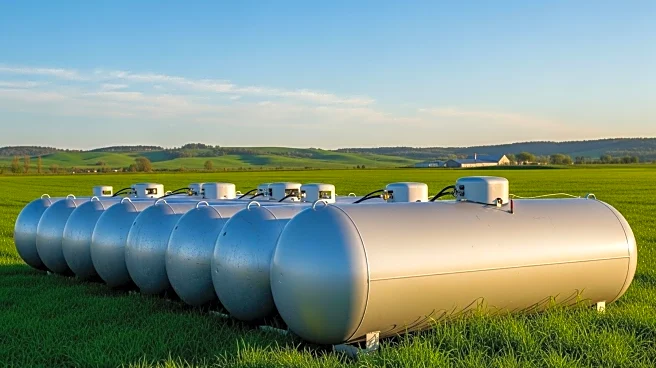What's Happening?
The Propane Education & Research Council (PERC) is emphasizing the critical role of propane in agriculture, particularly as concerns about power reliability grow across the United States. During the fourth annual National Propane Day, observed on October 7, PERC highlighted propane's reliability and efficiency in powering essential farm operations. Propane is used to fuel grain dryers, irrigation engines, and heating systems for buildings and livestock, as well as backup generators, ensuring continuous operation during critical periods such as harvest or calving. According to Mike Newland, PERC's director of agriculture business development, propane provides farmers with energy independence, allowing them to maintain operations even when the grid fails. Propane's sustainability benefits include producing fewer emissions than diesel or gasoline, which helps farmers reduce maintenance costs and environmental impact.
Why It's Important?
The emphasis on propane as a reliable energy source is significant given the U.S. Department of Energy's warning that power outages could increase 100-fold by 2030 due to rising energy demand. Propane offers a solution by being stored on-site and remaining ready for use during prolonged outages, providing farmers with a dependable energy strategy. This reliability is crucial for agricultural productivity, especially during critical periods like harvest and calving seasons. Additionally, propane's lower emissions contribute to environmental sustainability, aligning with broader goals to reduce the agricultural sector's carbon footprint. Farmers stand to benefit from reduced operational costs and increased energy security, which are vital for maintaining competitiveness and resilience in the face of potential energy disruptions.
What's Next?
As National Propane Day continues to raise awareness, PERC is actively promoting educational materials, financial incentives, and connections to local suppliers to help farmers plan ahead. These initiatives aim to encourage more widespread adoption of propane in agriculture, enhancing both productivity and environmental sustainability. Farmers may increasingly turn to propane as a strategic energy choice, supported by PERC's resources and advocacy. The ongoing dialogue around energy reliability and sustainability is likely to drive further innovation and investment in propane technologies, potentially influencing policy decisions and industry standards in the agricultural sector.
Beyond the Headlines
The focus on propane highlights broader issues of energy independence and sustainability in agriculture. As farmers seek to mitigate risks associated with power outages, propane's role as a reliable and cleaner energy source becomes increasingly relevant. This shift may prompt discussions on the ethical and environmental responsibilities of the agricultural industry, encouraging a move towards more sustainable practices. The long-term implications could include a reevaluation of energy strategies across the sector, fostering resilience and adaptability in the face of changing energy landscapes.









